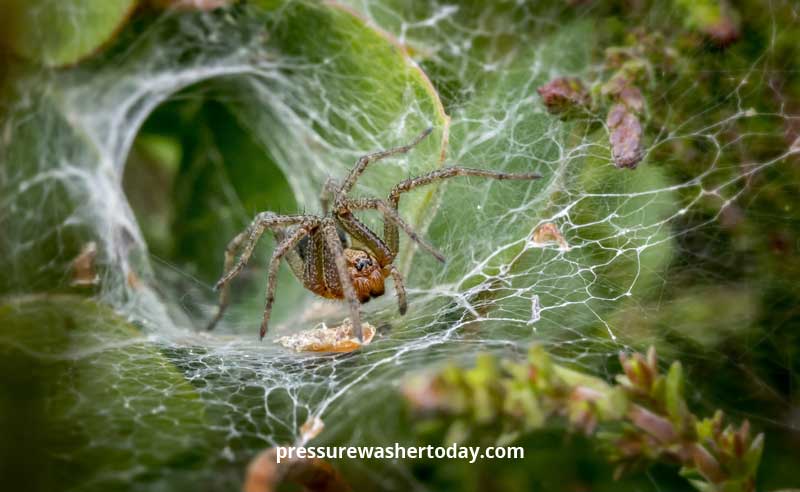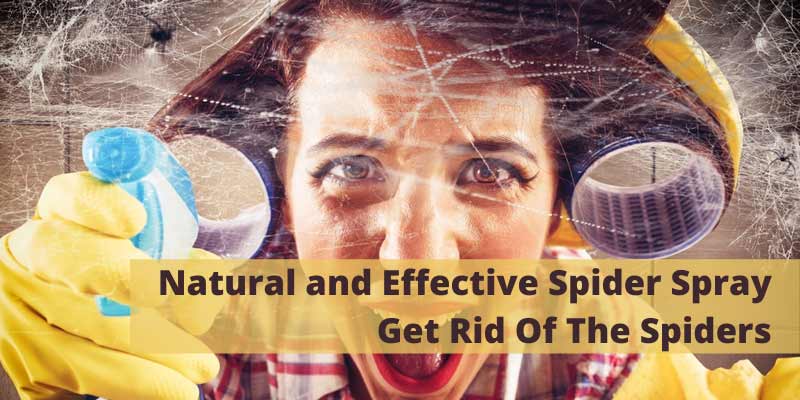Spiders are something we all do not like and prefer that they stay out of our sight and especially away from our home.
While daily control spray controls and kills spiders when they go to their web, control spraying keeps them far, far from your home. Furthermore, this natural Spider Spray is a no-brainer, providing significant cost savings over traditional pest control services by pest control professionals.
It is annoying seeing these spooky and creepy insects in your home. They are not monsters, fantasies, or even bogeymen … they are spiders! Spiders are searching for ways of getting inside your home, this time of year. Spiders prefer our home’s warmth as it is more appealing every day irrespective of the cold weather outside our homes!
Table of Contents
Most Simple Home Remedy To Keep Spiders Away
Fill the selected spray bottle with water and add the necessary peppermint oil. Give it a good shake, and there you have a natural spider spray that is easiest and most effective. Spray windows and foundations around the external and interior doors to keep spiders out every week. Take a deep breath and discover how awesome your home is. Shake the oil and water before every use.
I like to use a glass spray bottle for this spray because with plastic containers oils will often break down the plastic and cause the container to collapse when the peppermint oil is stored in plastic. Also, you can contact pest control professionals and get the best non-natural chemical solutions, at a price.
When Do Spiders Prove To Be Harmful?
Spiders can benefit you by maintaining the population of the insects in your yard or garden, especially those that can spread diseases like mosquitos, flies, fleas, and roaches. Spiders are also famous for attacking and consuming other spiders.

Spiders reproduce during their life cycle, and only one spider egg bag can accommodate 100 to 3,000 eggs. You can end up with a population of spiders starting out in your home if the egg sac hatches inside a room.
Spiders do not cause permanent structural damage as do many insects and household pests, and most do not pose health hazards. Most North American spiders do not bite unless they are endangered, and most are only an irritant.
Do Natural Repellents Work?
Natural repellents for spiders may sound fantastic, but is it an effective infestation solution? Find out how the spiders in your home will be affected by the repellent from the pest control professionals.
It might sound pleasant for you to use a natural spider repellent, but it seems even better for your home spiders. Such so-called ‘repellents’ are nothing but additives that spiders are commonly exposed to e.g. hedge apples. You may rotate repellents, but some of them live in the repellents. In a way, all you do is create a perfect spider habitat – not repel them naturally.
Natural Spider Sprays and Spider Repellents
Insects and spiders are repelled by many of the natural components. Such natural based chemical sprays and can be used as a natural insecticide directly on a spider. Alternatively, you can use the sprays to stop spiders from entering the building through walls, doors, and other places.
Natural Spider Repellent Spray Using Essential Oils
In conjunction with other essential oils, several people have managed to kill spiders with peppermint oil sprays. Essential oils have chemicals that influence numerous insects to lethal effects, including arachnids. The strong smell of peppermint oils, clove oils, and cinnamon oils also repel spiders. The International Journal of Drug Development and Science released data on the properties of peppermint oil as an insecticide. Scientists have found that peppermint oil actively repels many insects and their larvae. You can read the article by clicking here. There is a further article on Peppermint Oil and Spiders: Know the Facts from the www.healthline.com which you can read by clicking here. Please heed the articles emphasis on the risks and warnings.
How To Protect Your Home From Spiders?
The best way to fix the dilemma is by stopping the spiders from getting into your home in the first place. Below are several suggestions to avoid the spiders from pest control professionals:
- Use a sodium vapor bulb (or equivalent) in an outdoor light at night so as not to attract spiders and insects.
- Check the exterior of your home carefully and fill small gaps and cracks, in which spiders can enter your home or build egg nests in them.
- Remove from your home as many insects as possible, including bees, flies, and other bugs spiders like to feed on. A pest control professional service can also be found to help you in getting rid of spiders.
Quick Ways To Get Rid Of Spiders
Several indoor spider control methods provided by pest control professionals are successful and lethal to spiders.
Spider traps and sprays are typically favored. Pyrethroids, chemicals produced in large part from plants in chrysanthemum families, are the basis for the most spider killing formulas.
Spider traps such as glue boards are nontoxic and economical but can be less effective when confronted with larger infestations. Place them in corners, along walls, and everywhere you see spiders.
Spider sprays are easy to use, destroy on touch, and leave a residue. Spray under the furniture and corners around the baseboards.
Natural Spider Sprays
Find these natural alternatives when provided by pest control professionals as alternatives to poisonous chemicals when you want to repel spiders from home with natural substances.
Earth diatomite: Like insect pests, spiders also are subject to laceration from it, diatomaceous earth can lacerate their exterior and lead to dehydration. They can be killed by diatomaceous earth. In trying to reach areas like between and behind cabinets, diatomaceous earth is best used in small dustings.
You should shake peppermint oil directly on cotton balls and place them into holes, where the spider is suspected of hiding. Spiders do not tolerate peppermint smell, and every area in which it is applied will be avoided. Eucalyptus oil can also be used for the same purpose.
Vinegar: In a spray bottle mix equal parts of white vinegar and water and spray directly onto the spiders. Vinegar contains acetic acid that, when it comes into contact with spiders, burns the spider.
Dry baking soda, lemon juice, or water solutions combined with tobacco are other natural substances capable of being effective in repelling spiders as told to me by pest control professionals.
Safety: Do not use diatomaceous soil on counters, opened or drained areas, or in any food preparation location. Apply in small dustings and then wash off any visible residue. Although there are children or pets at home, read and follow always the directions on labels for safely use with every pesticide.

Other Natural Spider Sprays That You Can Use
Find these strategies if you want venomous and non-venomous spiders to stay out of your house. Keep cats, or even frogs because like birds they find spiders are prey to hunt.
If you want to kill only one or a few spiders more effectively, use a vacuum cleaner. Spider physiology is not strong enough to withstand suction of most of the vacuum cleaners, and the force will almost instantaneously crush them against the tube or internal chamber of the system.
It may be more humane to capture the spider in a jar or container and release it outside if you do not have a deep appreciation for spiders. Look at the markings when you find a single spider. If the spider is not poisonous, flip over a cup or bottle and slip a piece of paper or a notecard carefully under the bottle ‘s head. If your hand holds the paper in place, turn over the container quickly so that the spider lands at the bottom of the container and then take it outside so that it is at least 10 feet from your home to release it.
- For spiders to be deterred, the chosen treatment methods must be accompanied by preventive steps. It involves removing other insect pests, including roaches, and flies from around your house as they attract spiders searching for a meal.
- First, clean carefully because if there is a lack of hiding places spiders will avoid very clean homes.
- Whenever you see them, be sure to brush or vacuum spider webs and egg sacks.
- Hold food in storage bins securely locked away. This is because if they are used to deter ants, roaches, and other rodents that will also help remove a source of food for spiders.
- Remove and kill spiders hiding in shoes, garbage, and everything else in which they can hide, even in packed old magazines.
- Use pesticides or other treatments as advised for any other insect problems.
- Take outdoor protective steps to deter spiders.
- Seal the house to prevent cracks, and bugs coming inside to attract spiders. Small mesh insect screens can help prevent insects getting inside.
- Apply deterrents on wire, ropes and electrical equipment running to the outside.
- Remove or patch broken window displays and fill in window gaps.
- Use an outdoor sodium vapor light so that other pests that can be prey for spiders are not attracted.
- Remove vegetation from your house within 8 feet.
The removal of spiders will require an indoor and outdoor strategy management combination.
When the spiders are killed or removed you must ensure that other insects do not enter your home in order to prevent the spiders from coming back in search of prey.
It is a safe way to avoid spiders from finding food in your home as a strategy to avoid spider plagues. Also, the best way to keep spiders away is by hiring pest control professionals. All you need to do is to give them a call, and they will help you out with the best and safest solutions. This is the overall best solution and my recommendation.
BIO:
This is a guest post article by Vaishali Sonik for www.owyheeenvironmental.com who are Residential Pest Control Experts in Meriden and Boise, ID.. They are members of The National Pest Management Association.
Disclaimer: This is a guest post article and we have not verified the contents. We recommend that you should seek personal professional advice from Residential Pest Control Experts who are members of The National Pest Management Association in the United States. If you live in another country a simple Google search will produce the name of the equivalent association in your country.

